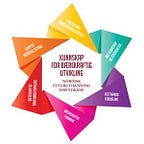Clean Coast Randaberg
Alexander Rugert-Raustein (No)
Contact: alexanderrugertraustein@gmail.com
Summary
This project wants to show, how the Rein Kyst Prosjekt — Clean Coast Project in Randaberg Commune can function as a learning arena both about and for sustainable development.
The project is at the time of writing come to a halt, due to a setback in financing a broader, expanded scheme. None the less, I will argue for a learning effect for those few involved in the project until now.
Marine waste does not have an owner. It is polluting a common: the sea and its shores. As no one is legally responsible for it, this leads to a situation where no one takes action triggered by a feeling of responsibility. Voluntarily collecting waste leaves you with the challenge of not knowing how to dispose of the waste in an appropriate manner and eventually being liable to pay a fee to get rid of a problem that is not yours.
Single beach cleaning actions solve the problem by organising bags for collection and a one-time pick-up of the waste collected.
The Clean Coast project aims to make these solutions permanently available, in order to make continuous clean up on volunteer basis possible. Dispensers for garbage bags and disposable gloves set up together with collection points along the coast should make it possible for hikers to do a small job as they walk along the shore. The view of a spoiled and littered coastline can induce spontaneous wish to do something about it. The dispensers together with collecting points make it possible to react instantly.
At the same time information boards will be set up together with the dispensers inform about the problems related to marine waste. Thus increasing people’s knowledge and hopefully will to do something about problems related to environmental pollution and the impact on our own well-being in the end.
Sterling has established three levels of change coming from three levels of learning. These levels are first order learning that promotes cognition leading to improved ways of doing things. Second order learning is related to meta-cognition leading to behavioural change aiming at doing better things rather than just improving old behaviour. Third order learning gives incentives to question your world-view eventually leading to a paradigm shift leading to lasting behavioural change.
The purpose of education becomes disruptive capacity building, ex. the ability to deconstruct norms.
“These days’ people expect authorities to take care of commons since they should have the resources to do so, funded by paid taxes”, Hermansen gathers. Referring to Elinor Ostrom he also shows that:
fellow use, based on trust and believe in local autonomy rather than privatisation and state governance, are key to functioning and living commons.
The project informs the public about the environmental problems related to marine waste and thus increases the knowledge about the topic. It also implicit shows how to live more sustainable by reducing waste, the amount of waste astray and the challenge to clean up the mess already made.
The sheer job to be done intensifies this experience supporting the learning physically. Thus the public learns about (un-) sustainable behaviour and how to do something about it.
Being empowered to do something about an enormous challenge like marine waste gives a feeling of belonging and ownership.
This should lead to an increased feeling of fellowship around the shore as a living common as well as a disruption of the norm that the authorities have to step up to save commons’ livelihood.
